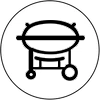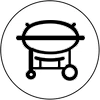On April 2, 2025, President Donald Trump announced sweeping new tariffs that are set to shake up the meat industry in a big way. For meat lovers in the U.S., this news might sound confusing or downright worrying. What does a tariff have to do with your steak dinner or barbecue plans? In simple terms: higher costs on imported goods mean many meats – from everyday beef to exotic imports – are about to get pricier. But before you panic about your next grocery bill, let’s break down what’s happening and why Meat N’ Bone has your back through it all.
The Tariff Lowdown (and Why Your Beef Might Cost More)
Trump’s “Liberation Day” tariffs impose a baseline 10% tax on all imports, with much higher rates for certain countries. That includes a 25% tariff on beef coming from Canada and Mexico – two major sources of cattle and meat for the U.S. This is a big deal because the U.S. relies on imported beef more than you might think. In fact, American processors import a massive amount of lean beef from Canada and Mexico to mix with fattier U.S. cuts, creating the affordable ground beef found in supermarkets and fast-food burgers. With a 25% tax on those imports, the cost of producing ground beef and other budget-friendly cuts is set to jump, and that price hike will trickle down to grocery stores and burger joints.
Who Feels the Pinch First?
Likely everyday shoppers and fast-food fans. If you love a cheap hamburger or stock up on bargain beef, brace yourself – those supermarket “value pack” prices are headed up. (By the way, here’s a pro tip: “USDA Choice” on a label doesn’t guarantee the beef came from U.S. cattle. It’s a grade, not a country-of-origin – that ultra-cheap steak on sale was probably imported.) Restaurants that rely on inexpensive beef are also affected. Your favorite fast-food combo might edge up in price, and even mid-range steakhouses serving “Choice” cuts could charge more to cover their higher costs.
Now, you might think “Well, fine, I’ll buy American beef instead.” Supporting domestic ranchers is great in theory – and it’s partly what the tariffs aim to encourage – but it’s not so simple in practice. U.S. cattle supply is at a historic low, thanks to years of drought and high feed costs thinning herds. Ranchers can’t just breed more cattle overnight to fill the gap. So even though demand for U.S. beef is rising (with imports getting expensive), the limited supply means prices for domestic beef (yes, even USDA Choice and Prime) are likely to climb. In fact, beef prices were already surging before tariffs – the average price of ground beef in U.S. cities is up 43% since 2020 – and the new trade barriers could push them higher.
At Meat N’ Bone, we’ve anticipated these challenges. We never built our business on ultra-cheap, imported beef to begin with. Instead, we source our beef from small American farms and trusted programs, focusing on quality and traceability. That means we’re far less affected by the tariff turmoil than the big-box grocers. While major retailers scramble to replace Canadian beef, our supply chain stays steady. We’ve partnered directly with ranchers for years, so when you shop with us, you’re tapping into a network that’s built to withstand market shake-ups.
Poultry & Pork: When Beef Gets Pricey, Everyone Wants Chicken (and Bacon)... and ours is THE BEST
Historically, when steak prices shoot up, consumers start saying “How about chicken tonight?”. We expect to see more Americans turning to poultry and pork as cost-friendly protein alternatives if beef becomes a luxury. But even these categories aren’t totally off the hook.
-
Poultry: The U.S. is largely self-sufficient in chicken, so tariffs won’t hit your whole bird or wings directly. However, if millions of shoppers swap steak for chicken, surging demand could nudge chicken prices upward. Plus, raising poultry isn’t immune to ripple effects – chickens eat corn and soy feed, and if those feed costs rise (more on that soon), it could make chicken a bit more expensive to produce. Don’t worry, you won’t see chicken doubling in price overnight, but a slight uptick at the meat counter wouldn’t be a surprise.
- Pork: The pork supply chain has some surprising international links. For example, Canada exports millions of piglets to U.S. farmers each year, where they’re raised to market weight. Tariffs on Canadian livestock mean those baby pigs just got pricier, which in turn raises costs for U.S. pork producers. So, while the U.S. produces plenty of pork, bacon and chops might get modestly more expensive as farms adjust to higher input costs. Additionally, if bacon-lovers and steak-skippers all turn to pork, demand jumps and so can prices.
The good news? Meat N' Bone focuses on sourcing the BEST quality of pork, chicken and alternatives to beef, including seafood. We are your one stop shop for any high quality protein at value prices.
Exotic Meats & Luxury Imports: From Wagyu to Jamón Ibérico
It’s not just everyday meats feeling the tariff pinch. Luxury and exotic proteins are squarely in the crosshairs of this trade policy. If you’re a fan of world-class Wagyu or fine European charcuterie, here’s what to expect:
-
Japanese & Australian Wagyu Beef: Japan and Australia are famous for their Wagyu, from melt-in-your-mouth A5 Japanese beef to Australian Wagyu known for rich marbling. Under the new tariff scheme, imports from Japan face roughly a 24% tariff and Australian goods around 10%. In practical terms, that Kobe steak from Japan or Wagyu striploin from down under is going to cost more to bring stateside. These were already high-end, pricey items – now they’re even more exclusive. At Meat N’ Bone, we do carry authentic Japanese Wagyu, and while global costs may rise, our direct relationships in Japan help us minimize extra costs for our customers. We also offer domestic alternatives like 100% Colorado Wagyu that deliver indulgent quality without the import tax. In short, you can still enjoy a transcendent Wagyu experience with us, tariff or no tariff.
-
European Delicacies (Ibérico Pork & Charcuterie): Europe, including Spain, falls under a roughly 20% tariff on imports. That means gourmet items like Jamón Ibérico, Prosciutto di Parma, Spanish chorizo, and French pâtés will see price increases. These products already carry premium price tags due to artisanal production and limited supply – tariffs add another layer of cost. If fancy cured meats are your thing, you might have to pay a bit more for that indulgence. However, Meat N’ Bone is well-prepared here too. We’ve always been very selective with our imported charcuterie, working with suppliers who ensure consistent quality and fair pricing. We’ll continue to offer these luxuries and will be transparent about any pricing changes. Remember, quality and flavor like this are worth it, and with us you know you’re getting the real deal.
- Other Exotic Game & Imports: From New Zealand lamb to South American game meats, virtually any imported protein now carries at least the baseline 10% tariff. So, exotic meats sourced from abroad are subject to a bump in cost. Fortunately, many game meats (like bison or venison) are farmed in the U.S. too. We prioritize domestic sourcing for exotics when possible, which helps keep our prices competitive and supply reliable. If you’re craving something out of the ordinary, we’ve got options that won’t break the bank.
Ripple Effects: Feed, Fertilizer, and Farm Costs
Tariffs don’t just impact the price of meat coming over the border; they have ripple effects through the whole food supply chain. Think of it like dropping a rock in a pond – the waves spread far and wide. Here are a few downstream impacts to keep in mind:
-
Feed and Grain Prices: Raising cattle, pigs, and poultry requires tons of feed (quite literally). Corn, soybeans, and other grains are the foundation of animal feed, and their prices can swing with global trade policies. One example: fertilizer for those feed crops. A key ingredient like potash (potassium fertilizer) is 93% imported by the U.S., and about 79% of that comes from Canada. Slapping tariffs on Canadian goods means fertilizer costs for American farmers could shoot up, which makes growing corn or soy more expensive. Over time, higher feed costs translate to higher costs to raise each chicken, pig, or steer. So tariffs in one area (minerals from abroad) can indirectly make your T-bone or turkey cost more. It’s a complex web!
-
Equipment and Transportation: Modern farming and meat processing rely on equipment – tractors, feed mixers, refrigeration units, you name it. Much of this equipment or its components are imported. Industry experts warn that even U.S.-assembled farm machinery will see price jumps under broad tariffs, since so many parts come from overseas. If tractors and trucks cost more, farmers and distributors face higher overhead, which eventually adds a few cents here and there to consumer prices. It might not be obvious on the receipt, but these factors add up across the industry. (And if you’ve heard about general inflation in food recently, trade uncertainty is one of the culprits driving up costs.)
- The Big Picture – Volatility: Perhaps the biggest impact of all this is uncertainty. Tariffs can lead to tit-for-tat retaliation between countries, and when that happens, markets get volatile. For instance, if Canada or Europe answer back with tariffs on U.S. goods, American farmers could lose export markets for their products. That might lead to temporary oversupply (which could lower certain prices) or discourage farmers from expanding production (which keeps supply tight). It’s a bit of a rollercoaster. Economists broadly agree that these tariffs will make U.S. consumers pay higher prices for many foods , at least in the short run. Long term, if beef stays expensive, some folks might permanently shift their diets toward other proteins or plant-based options. The takeaway: big policy moves like this inject a lot of unknowns into the food system.
Meat N’ Bone: Your Steadfast Source in Turbulent Times
With all this talk of rising prices and uncertainty, it’s fair to wonder: What should I do as a meat consumer? Our honest advice: don’t panic – prioritize quality and reliability. This is where Meat N’ Bone truly shines. We built our business on the idea that you get what you pay for, and that a great steak or roast is worth a little more because of the care behind it. That philosophy is more important now than ever.
Why choose Meat N’ Bone during a tariff storm?
-
Resilient Sourcing: We have long-standing relationships with farms and suppliers. Many of our premium products are domestic, from gorgeous Colorado Wagyu beef to locally raised poultry and pork. These don’t get slapped with import taxes, and we work directly with producers – cutting out middlemen – to keep prices as fair as possible for the quality you receive. When we do import (say, Japanese Wagyu or Spanish jamón), we do it selectively and efficiently, leveraging our partnerships to navigate extra costs. The result: a consistent supply of top-tier protein, no matter what’s happening in global trade.
-
Quality Over Quantity: In uncertain times, doubling down on quality is a smart move. A smaller portion of outstanding steak can be more satisfying than a large portion of mediocre beef. If prices are rising everywhere, the difference in cost between average meat and exceptional meat narrows. This is the perfect time to treat yourself to better quality. Our customers have always understood that great meat is an experience, not just a commodity. We source ethically raised, properly aged, hand-cut meats that deliver flavor and tenderness that supermarket chains can’t match. With Meat N’ Bone, you’re making an investment in enjoyment and peace of mind – you know exactly what you’re getting, and why it’s worth it.
-
Steady as a Rock: While others scramble to find supply or adjust their business models, we’re already positioned for consistency. We’re not changing our standards or cutting corners because of these tariffs. Our team anticipated these shifts and we’ve stocked up appropriately and diversified our offerings. Whether it’s offering more domestic Wagyu options or ensuring our pricing on staples remains competitive, we’re on it. You can count on us to have the meats you love in stock and ready for delivery, tariff disruptions be damned.
In conclusion, yes – the tariff announcement is significant, and it will reverberate through the meat world in the months ahead. Beef, poultry, pork, and luxury imports will all see some changes in availability and price, and as a savvy consumer it pays to stay informed. But you don’t have to navigate this alone. Meat N’ Bone is here to help you make sense of it and continue enjoying premium proteins without compromise. We’ve weathered storms before by sticking to our core values of quality, transparency, and top-notch service. This is no different. In fact, it’s an opportunity for more people to discover the Meat N’ Bone difference – that even when the market gets tough, you can still savor the very best.
So whether you’re grilling up a USDA Prime ribeye, roasting a pasture-raised chicken, or splurging on that bucket-list Wagyu steak, know that we’re working hard behind the scenes to keep you well fed with the finest meat, sourced the right way. Tariffs or not, dinner is served – and it’s delicious. Bon appétit!














